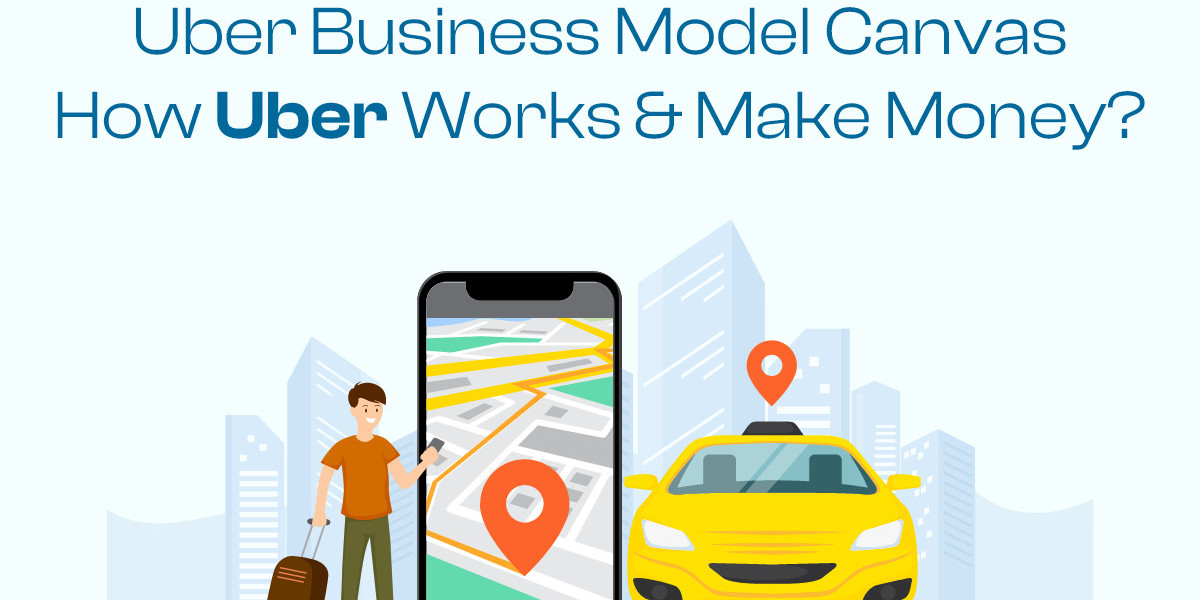Past were days when hailing a taxi was a nightmare. However, the scenario has changed completely today, thanks to mobile technology and an app like Uber. Now, we no longer have to wait longer and wave to hail a taxi; we can get it with just a few clicks on our smart device.
The changing trend has provided businesses with various opportunities; many have started to offer their ride-hailing service online, while others are thinking of following the success footprints of Uber. If you are the same, understanding the Uber business model canvas can help you know how Uber works and how Uber makes money.
Statista report shows that revenue in taxi-hailing is estimated to reach around US$314,224m in 2022. It's forecasted to grow by 5.30% CAGR between 2022 and 2026, resulting in a market volume of US$386,274m by 2026. It became easier for users to book a ride with an app similar to Uber. The giant has gained huge popularity globally in a short time due to its amazing service offering.
What is Uber?
Uber Technologies, Inc. is an American service provider. Uber is based in San Francisco and operates in about 72 countries and 10,500 cities. The business giant offers services that include ride-hailing, package delivery, food delivery (Uber Eats and Postmates), couriers, electric bicycles, motorized scooter rental, and ferry transport.
The company doesn't own its own vehicles; however, it receives a commission from every booking. More than 93 million people in 2020 will use Uber on a monthly basis; the number shows 19% growth compared to the previous quarter. Uber is the most preferred and popular taxi-hailing platform worldwide.
Based in San Francisco, the company's global net revenue is expected to reach around 11.1 billion U.S. dollars in 2020. Uber generated 57.9 billion U.S. dollars in gross bookings from an average of 19 million trips per day.
As of January 2022, Uber had 71% of the market share and 27% for food delivery. Uber is prominent in the sharing economy; however, many startups have described their service offerings as "Uber for X."
How Does Uber Work?
Founded in March 2009 by Travis Kalanick and Garrett Camp, Uber offers a quick ride-hailing service to its users. The emerging business giant enables riders to book a taxi from point A to B. It makes it easier for them to pre-calculate the fare, estimated arrival time, and more with a few taps on the app. Once the rider places the request, the driver gets notified about it; they choose to accept/reject the ride and reach the destination to offer the service.
The company was founded when the founders faced difficulty finding a cab on a windy-cold evening. Uber is always trying to improve its service by adding new features, functionalities, and more to the platform. Recently Uber introduced a feature, "Explore," which enables customers to book and browse the experiences like live events and many other fun activities.
Today, the company is estimated to have a million active users worldwide; it's a unicorn valued at ~$60 billion and offers ride options from affordable bikes and scooters to Uber Air. It has also introduced:
UberX: The basic Uber ride.
Uber Green: Electric vehicles.
Uber Black: Luxury cars.
Uber Pool: Shared rides.
Uber Comfort: New cars with extra legroom.
UberXL: Vehicles with a capacity of up to 6 people.
Uber Transit: Real-time public transport information.
Uber WAV: Wheelchair accessible vehicles.
Uber Lux: Luxury vehicles with top-rated drivers.
Uber Black SUV: SUVs with professional drivers.
Uber Taxi: Local taxi cabs partnered with a ride-hailing giant.
Uber Flash: A specialized taxi system designed for Hong Kong.
Uber Auto: On-demand auto rickshaws.
Uber Air: Flying vehicles.
Bikes: On-demand electric bikes.
Scooters: Electric scooters.
Uber, a mobility-as-a-service provider, also tested a new algorithm that changed drivers' payments in around 24 U.S. cities. It enables drivers to checkout pays as well as a destination before accepting a trip. The algorithm raises the incentives for drivers in an effort to attack more drivers.
Uber builds advanced features and functionality like Explore, showing ambitions beyond rides and delivery and the potential to become a "Super app." This single app ensures to offer a multitude of functions. Moreover, Uber issued a statement in support of Ukraine, saying it offers unlimited free rides between the Ukraine-Poland border and Polish cities.
4 Step Model Explaining How Uber Works
Book a Taxi
The very first step of the Uber business model canvas is to create demand. People can download an app to request a cab instantly with a few clicks. They are also allowed to schedule the ride at their convenience.
Matching
As soon the customer requests the ride, the nearby driver gets a notification along with complete details. The driver has the option to accept/reject the ride. If the driver rejects the request, a notification is sent to another cab driver in the same area.
Ride
Customers are allowed to track the drivers and know the ETA once the driver accepts their riding request. Uber's drivers make sure that riders get a comfortable experience throughout their ride.
Payment & Rating
Once after reaching the destination, customers can rate the driver. The rating system is a crucial part of the Uber business model as it enables other riders to check about the driver before booking the ride, helping to build trust.
Uber Business Model Canvas: How it Benefits All its Ubers?
Uber service offering is not limited to ride-booking; it also offers services like ride-sharing, peer-to-peer ride-sharing, food delivery, bicycle-sharing system, etc. San Francisco Based transport giant offers its service in more than 785 metropolitan areas worldwide. Riders can access Uber services through its website and apps. Uber works on a two-sided marketplace business model. It mainly has two sides:
- Taxi Drivers
- Passengers/Riders
Taxi Drivers
Uber provides drivers with the flexibility to work and earn additional income on their terms. Drivers can follow a few simple steps to earn by providing their service on-demand.
Passengers
The ride-sharing giant ensures to fulfill all the requirements of passengers. It enables the elimination of transport inefficiency. Riders who want to reach from point A to B can download the app to book the services. Ubers enables riders to check drivers' details and estimated fares and also track the rides.
Value Propositions
Customers:
- Riders no need to wait for a taxi for longer;
- Free rides on special occasions and discounts
- Lesser price than normal taxi fares
- A fixed price for common places
Drivers:
- An additional source to earn
- Flexible working schedule
- Easy payment procedure
- Beneficial for those who love to earn more
Customer Segments
- Does not own a car
- Does not aim to drive themselves to any function or party
- Like to travel in style and aims to be treated such as VIP
- Wanted a cost-efficient cab at doorsteps
"Your personal driver lets you travel in style," the tagline of the taxi-sharing giant says. The ride-hailing giant brought the concept of the aggregator model; the Uber business model canvas is unique and helps build partnerships and let other partners work under the brand rather than developing the offer.
Uber does not own cars; instead, aggregates or cab drivers owning their cabs work under a brand name. However the partners provide the service, the ride-hailing giant makes sure that the service standards are met. Following the success footprints, many taxi brands are choosing to invest in the Uber clone app that helps them provide excellent service to the customers on-demand.
Prospecting Deep Into Uber's Revenue Model: How Uber Makes Money?
Wondering how Uber makes money? The ride-hailing giant takes a cut on every ride from the drivers. Moreover, the Uber revenue model is quite more complex than trip commissions. The commission-based model helps the ride-hailing giant to make a good profit.
Uber brings in passengers to drivers and provides them with various payment options, including credit cards, wallets, and more. Uber charges around 20 to 25% of the ride fees as well as other fees such as safe rides, booking rides, etc. The ride-hailing giant follows standard prices per mile/kilometer and other different classes of rides. Let's explore different methods to know how Uber makes money?
Trip Commissions
Uber provides a platform to drivers with a robust supply of ride requests to accept/reject, fulfill, and earn income. While making a booking, a passenger is allowed to pay using various payment options. The ride-hailing giant then transfers the payment to the partner's account after cutting its commission (performing the task as a broker); the commission charge varies between 15 to 30% depending on the market.
Surge Pricing
This pricing strategy is a novel concept that has been used by Uber to make money. It has also opted for other verticals like food delivery and many more. Whenever there is high demand for what can be served at that moment, the fare price goes up based on a surge price calculation algorithm. Few drivers move to surge regions to earn extra, whereas few passengers wait to get a ride; this is how Uber manages the demand and supply mismatch situation systematically.
Premium Rides
The taxi-hailing giant offers multiple ride options from hatchbacks to sedans to SUVs and more. The profit margin for premium rides is higher and helps the company make more profits.
Cancellation Fee
The passenger is charged for canceling the ride after a certain time frame.
Leasing to Drivers
Uber is managing a vehicle leasing program in many countries to help drivers get onboard faster. Drivers who register with the platform have to pay a security deposit for the vehicle. The payment is deducted automatically from drivers' earnings on a weekly basis.
Brand Partnerships/Advertising
As stated above, Uber has millions of active users, which makes it a perfect option for brands to increase their visibility. The app interface pushes a feed-style layout for intuitive content consumption. However, it can prove as a good revenue source over time. The platform can be used as a channel for sponsored content.
Now, you might be clear about how Uber makes money, right? You can even start your taxi-hailing or ride-sharing business online at a pocket-friendly price. Have a look at pricing plans about our uber clone script solution or contact us to start your transportation business online today.
Wrapping it Up
The proliferation of the on-demand sector owes to Uber and is right as well. The company's success in some ways started with a chain reaction, and since then, many Uber clones have been launched and are expected to see more in the future.
Uber has managed to become the best mobile service company. Hopefully, this analysis of the Uber business model canvas and how Uber makes money will become a useful resource for you and other on-demand startups to get started in an ever-evolving sector.
The on-demand transportation and logistics industry is ever-evolving; hence it becomes crucial to introduce something new. If you fail to stay with the trend, you're going to lose various opportunities. It's the right time to launch your ride-hailing business online. Hurry up, get in touch with us and start a successful venture today! sales@whitelabelfox.com.















